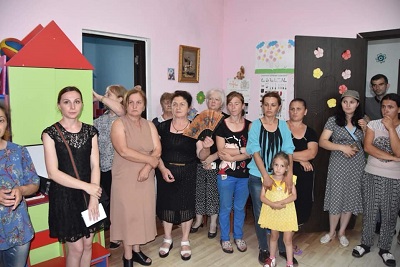Regular information-sharing meetings continue between IPRM participants and residents of villages adjacent to dividing lines
Date:
In the villages of Pakhulani (Tsalenjikha Municipality) and Khurcha (Zugdidi Municipality) located along the dividing line, information-sharing meetings were held between the Georgian participants of the Incident Prevention and Response Mechanism (IPRM) and the local population.

Firstly, the information-sharing meetings aim to inform the population living along the dividing lines about the meetings conducted within the IPRM framework. Secondly, these meetings intend to ensure and strengthen a regular dialogue between the IPRM participants and the conflict-affected population, internally displaced persons, members of women’s civil society groups, representatives of community-based organizations, active citizens and the youth, with the purpose of responding effectively to the local challenges, needs and priorities.
Representatives of the Office of the State Minister for Reconciliation and Civic Equality of Georgia (OSMRCE) and the State Security Service of Georgia (SSS) explained the reasons for discontinuing the IPRM meetings in Gali, as well as the potential ways to resume them in the future. The discussion was followed by a question and answer session with the local population, where specific humanitarian and human security concerns, as well as socioeconomic problems, were brought up and their possible solutions discussed. In particular, the local women raised such issues as the free and safe movement of people, the need for crossing points at the dividing lines and the importance of maintaining and strengthening people-to-people contacts.
The local population also emphasized their economic hardships, which are a major contributing factor to the massive outflow of residents from the villages adjacent to the dividing line, especially the younger generation. Further, the discussion covered a number of other matters concerning the locals, including the existing information vacuum, the low quality of Internet and mobile networks, the lack of outpatient clinics, doctors and pharmacies and the lack of access to banking services. “In fact, we are an orphaned island waiting in vain, but despite this, we, the local people, remain here and protect the village,” a woman from Khurcha declared.
These meetings are organized by the OSMRCE in cooperation with the SSS, with the support of UN Women and funding from the Government of the United Kingdom.